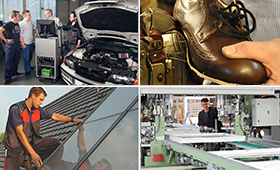Social environment: a critical factor in the career choice of young people
New findings on the reasons for the trainee shortage in the skilled trades
48/2018 | Bonn, 18.10.2018

When young people are faced with the question of whether to train for a skilled crafts occupation, their level of interest in the work, what they will earn, and the working conditions are not their only concerns. Even more important is whether the choice of occupation will positively impact their status in their social environment. If this is not the case, many stay away from the occupation concerned, even if they would have enjoyed the work it entails. These are the findings from a survey of around 1700 pupils which forms the basis of the latest issue of the BIBB REPORT series from the Federal Institute for Vocational Education and Training (BIBB).
For the skilled crafts, the influence of the social environment represents a huge challenge. This is because an increasing number of pupils come from homes in which parents themselves no longer have any connection with the skilled crafts and expect their children to achieve the higher education entrance qualification and a university degree. The consequence of this is that many of these children are no longer interested in even thinking about vocational education and training in the skilled crafts. They also know very little about skilled crafts occupations and what this work involves compared to their fellow pupils who still have contact to people in the skilled crafts via their acquaintances and relatives.
It is very likely that improved information about what work in the skilled crafts occupations currently demands would increase the interest of pupils. This is because what pupils want more than anything else—varied and creative work using the latest technology—is what, according to employer providing training, characterizes work in the skilled crafts occupations much more strongly than young people suppose.
However, the key question for young people still remains whether an occupation would enhance their standing or their status in their social environment. If this is not the case because, due to parental expectations, for example, they have long since given up considering vocational education and training in the skilled crafts, then even providing information about the actual work involved in these occupations is likely to achieve only very little.
For BIBB President Friedrich Hubert Esser, these findings make it clear that the role of career guidance in schools should not only be to provide information about the skilled crafts occupations and the modern demands of the work. “Instead, it must also highlight potential sources of identification for young people.” For this reason, he believes that, to provide one example, sending trainees into school classes as training ambassadors is the right idea. “A young trainee with a higher-level school leaving certificate who has consciously decided on a skilled crafts occupation most typically associated with men, such as plumber or metal worker, has a far more emotionally meaningful impact on pupils than a brochure using clever arguments to promote a career choice independent of stereotypes.”
“Reaching parents”, continues Esser, “in order to effectively respond to the shortage of apprentices in the skilled crafts remains a particular challenge”. He adds that the study clearly shows that this is necessary. “The equivalence of general and vocational education and training must be more clearly articulated to parents than ever before. This requires political communication initiatives which describe career pathways in the skilled trades that can lead to attractive employment opportunities through to self-employment. He explained that the career goal of ‘entrepreneur’ should be given particular emphasis. In addition to this, measures are required which will make an immediate impact on public perception - for example, turning ‘student residences’ into ‘education and training residences’ also open to trainees, or creating a trainee ticket which is valid nationally - similar to the semester ticket for students.”
Further information, statistics and tables are available in: BIBB REPORT, issue 5/2018 “What makes vocational education and training in the skilled crafts attractive”. Download at www.bibb.de/bibbreport (German only).
Image material is available at www.bibb.de/pressefotos.
Specimen copy requested if printed.